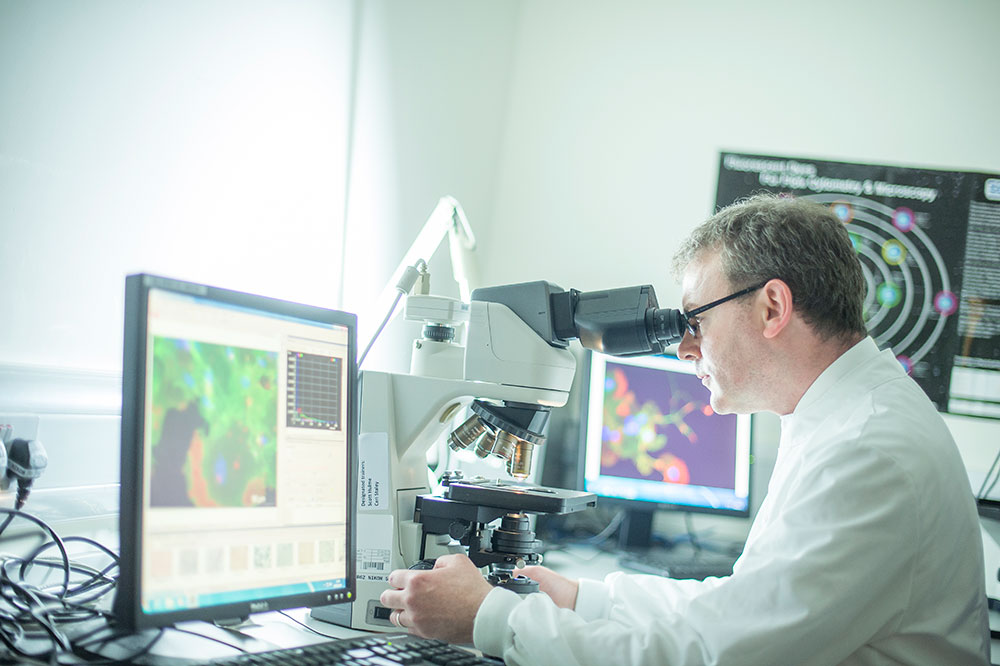Scientists at the University of Nottingham have received more than £1million in support for research that aims to develop new treatments for advanced prostate cancer and to train the next generation of prostate cancer research leaders.
The work, being led by Professor Nigel Mongan, in the university's Biodiscovery Institute, aims to find out how some prostate cancer develops resistance to current hormone therapies and whether improved hormone therapies or new drugs could be used to prevent, delay or reverse this resistance, helping men with prostate cancer to live longer, healthier lives. The research team includes Drs Jennie Jeyapalan and Corinne Woodcock who work with colleagues in the USA, Sweden and Austria to deliver impactful research.
The news comes as some of the world's leading prostate cancer scientists are due to gather in Nottingham alongside representatives from local patient support groups for an international symposium on Wednesday 3 May, where they will present their latest research findings.
We are enormously grateful for the support of Prostate Cancer UK, Prostate Cancer Foundation and the John Black Charitable Foundation, and private individuals, who are enabling this important research and the career development of outstanding early career researchers.
He added: "For these reasons I am optimistic that in the future patients with prostate cancer will live longer and healthier lives."
Prostate cancer is the most common cancer in men, with more than 52,000 men in the UK diagnosed with prostate cancer every year on average, resulting in more than 12,000 deaths. 1 in 8 men will be diagnosed with prostate cancer in their lifetime, which rises to 1 in 4 for Black men.
The Midlands is badly affected by late prostate cancer referrals and diagnoses: 1 in every 6 men there with the disease at an advanced stage that is sadly incurable, compared to 1 in 8 in London. In Nottingham in 2020, 577 men were diagnosed with and 206 died from prostate cancer.
A 30-second online risk checker is available at prostatecanceruk.org/risk-checker
The university's research will be supported by a grant of more than £259,000 from the charity Prostate Cancer UK and almost £195,000 from Prostate Cancer Foundation and John Black Charitable Foundation. This money has been matched by generous support from the university and private donors which is enabling this ambitious program of research
Prostate Cancer UK has funded this project as part of the charity's Research Innovation Awards (RIAs), a £3m investment across seven UK institutions in the latest advancements to defeat prostate cancer.
Over the past year alone, Prostate Cancer UK has invested over £9.5m into research that will save and improve men's lives.

Simon Grieveson, Assistant Director of Research at Prostate Cancer UK, said: "We urgently need newer, and more effective, treatments for men living with advanced prostate cancer, so that they can live as long — and feel as healthy — as possible.
"Existing hormone therapies like enzalutamide can help keep the disease under control, sometimes for many years, but cancer cells eventually become resistant to them and continue growing.
"I'm delighted that Prostate Cancer UK has recently awarded over £250,000 to continue supporting Professor Mongan's vital research to establish how this treatment resistance occurs, to investigate novel therapies which may delay, reverse or even prevent this resistance, and ultimately to extend and improve men's lives."
Patient representative Robert Oldroyd, of West Bridgford, Nottingham, said he is privileged to have seen prostate cancer research from a number of different angles – as an ex-patient, working with men with prostate cancer, as a patient representative on a number of clinical trials, and evaluating research proposals for funding, from a patient point of view, for Prostate Cancer UK.He added: "As a patient treated twenty years ago, I marvel at the sophistication of diagnostic methods and treatments available now, including those for men with advanced incurable prostate cancer. Yet the number of men dying each year remains stubbornly high, in part because many men are reluctant to alert their GP to problems.
"This symposium, bringing together some of the world's finest prostate cancer scientists, will shed light on some of the most intractable barriers to conquering this nasty disease in men. Their dedication and skills are appreciated by men around the world. None of their work would be possible, though, without the generosity of charities, individuals and universities."
Early diagnosis improves outcomes for patients and there are good treatments including surgery or radiation therapy. However, for too many, the disease returns post-treatment and progresses to an incurable state.
Hormone therapies like enzalutamide work by stopping prostate cancer cells from using the hormone testosterone, which the cells need to grow. It blocks the part of the cancer cell that would normally respond to testosterone, so that when testosterone arrives at the cancer cell, it can't kick-start the growth processes.
However, Professor Mongan has found evidence that prostate cancer cells eventually adapt to hormone therapy by developing differently shaped components that cannot be blocked by enzalutamide and the treatment stops working.
Professor Mongan and his team believe that prostate cancer cells do this by adapting a process called RNA methylation to their advantage. RNA methylation can change how the instructions for making parts of a cell are used. The team is testing their theory by studying RNA methylation in cells from men with prostate cancer as well as in lab-grown prostate cancer cells – and whether differences in RNA methylation are linked to those cells no longer responding to treatment.
The team is looking at whether drugs that already target RNA methylation in other types of cancer can be used to prevent or reverse resistance to hormone therapy in cancer cells, and potentially extend the benefits of these treatments, bringing hope to men affected by this terrible disease.






